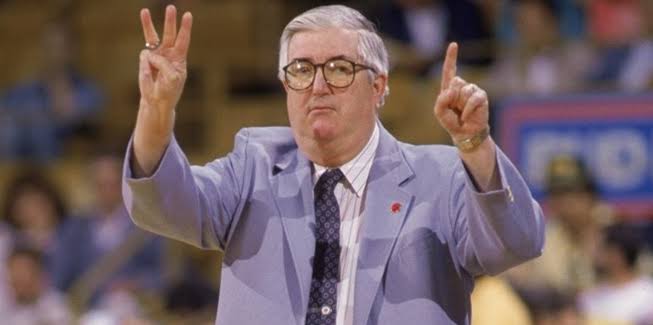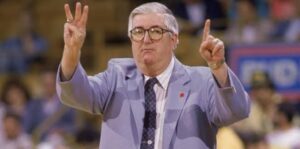Rest in Peace: NBA World morns the lost of Former Utah jazz Basketball Head Coach Frank Layden Passes Away at [93] After Brief Illness……

Rest in Peace: NBA World Mourns the Loss of Former Utah Jazz Head Coach Frank Layden, Who Passes Away at 93 After Brief Illness
The basketball world is draped in sorrow as it bids farewell to one of its most beloved figures. Frank Layden, the iconic former head coach and executive of the Utah Jazz, passed away peacefully at the age of 93 following a brief illness. Layden, whose infectious humor and deep basketball knowledge endeared him to fans and players alike, leaves behind a towering legacy—both on and off the court.
As the news of his passing broke, tributes poured in from across the NBA community. Former players, coaches, and team executives have all echoed a similar sentiment: Frank Layden was more than a basketball coach. He was a mentor, a friend, and a symbol of the NBA’s heart during its formative years. His larger-than-life personality, passion for the game, and genuine love for people helped shape not only the Utah Jazz franchise but the very culture of professional basketball.
The Humble Beginnings of a Basketball Legend
Born on January 5, 1932, in Brooklyn, New York, Frank Layden grew up with a gritty work ethic and a love for sports that would come to define his life. A graduate of Niagara University, Layden played college basketball before moving into coaching. He spent over a decade as a college coach, most notably at Niagara, where he laid the foundation for a lifelong journey in the game.
Though he would later become known for his humorous press conferences and larger-than-life personality, Layden was a fierce competitor and strategic mind. His coaching acumen caught the attention of the NBA in the late 1970s, when he joined the Atlanta Hawks as an assistant coach. But it was in Utah that his true legacy was cemented.
The Utah Jazz Era: From Struggles to Stability
In 1981, Frank Layden took over as head coach of the Utah Jazz, a then-struggling franchise trying to establish itself in a new city after relocating from New Orleans. The team was floundering—both financially and competitively. But Layden’s leadership brought a sense of stability, purpose, and most importantly, hope.
By combining sharp basketball insight with a deep understanding of human nature, Layden transformed the culture of the Utah Jazz. He had an eye for talent and was instrumental in the drafting of future Hall of Famers like John Stockton and Karl Malone. With these two cornerstone players, Layden laid the groundwork for what would become one of the most respected franchises in the league.
During the 1983-84 season, Layden led the Jazz to their first-ever playoff appearance, a monumental achievement for a franchise that had faced years of irrelevance. That same season, he was named NBA Coach of the Year, Executive of the Year, and received the J. Walter Kennedy Citizenship Award—making him the only person in NBA history to earn all three honors in a single season. It was a testament not only to his coaching ability but to his character.
A Unique Personality in a Serious Game
What made Layden so special was not just his success but his approach to the game. Known for his self-deprecating humor and quick wit, Layden often turned post-game press conferences into comedy routines. He once joked, “I’ve lost 10 pounds. I finally found out where it was—it was on the bench next to me.”
He brought levity to an often serious and high-pressure environment. But beneath the jokes was a man deeply committed to his players, staff, and the greater good of the game. Players loved playing for him not just because he knew basketball, but because he treated them like family.
Frank Layden was also deeply involved in community service, frequently volunteering for charities and speaking engagements. He used his platform not to elevate himself, but to bring joy and awareness to issues beyond the hardwood.

The Transition to the Front Office
In 1988, Layden made the decision to step down as head coach and pass the reins to his longtime assistant and friend, Jerry Sloan. It was a move that further solidified the Jazz’s continuity and future success. Layden continued to serve as the team’s general manager and president, helping to oversee one of the longest-lasting and most stable coaching tenures in NBA history.
His willingness to put the team above personal glory was perhaps his most admirable trait. Under Sloan’s leadership and with Layden’s support, the Jazz remained perennial contenders throughout the 1990s, making back-to-back NBA Finals appearances in 1997 and 1998.
Though he eventually retired from basketball, Layden’s influence never waned. He remained a fixture at Utah Jazz events, often seen courtside at games or offering commentary on the team’s current direction. He was a living reminder of where the franchise came from—and how far it had come.
A Legacy That Transcends Wins and Losses
Frank Layden’s career statistics—277 wins as an NBA head coach, multiple awards, and franchise-defining draft picks—only tell part of the story. His real impact was in the lives he touched. He was a father figure to young players, a mentor to up-and-coming coaches, and a friend to many in the basketball world.
The NBA has evolved immensely since Layden’s heyday, but the values he championed—loyalty, humor, perseverance, and community—remain as relevant as ever.
An Outpouring of Grief and Gratitude
Following the announcement of his passing, Utah Jazz owner Ryan Smith released a heartfelt statement:
“Frank Layden was the heart and soul of the Jazz during our formative years. His vision, humor, and kindness helped shape the identity of our franchise. We have lost a giant in every sense of the word.”
Karl Malone, speaking to reporters, called Layden “one of the greatest humans I’ve ever met. He believed in me when few others did. He made Utah feel like home.”
John Stockton echoed similar feelings: “Frank Layden gave me a chance, and I’ll never forget it. He built something real in Utah, and he did it with integrity, humility, and love.”
NBA Commissioner Adam Silver also released a tribute, stating:
“Frank Layden was a pioneer and a personality who brought warmth and intelligence to every aspect of the NBA. We are forever grateful for his contributions.”
Survived by Family and a Basketball Nation
Frank Layden is survived by his wife Barbara, his children—including his son Scott Layden, who followed in his father’s footsteps as an NBA executive—and numerous grandchildren. The Layden family has requested privacy during this time, while also expressing gratitude for the outpouring of love and support.
Final Thoughts
As the NBA mourns the loss of Frank Layden, it also celebrates the life of a man who made the game—and the world—better. He wasn’t just a coach; he was a builder of men, a steward of the sport, and a beacon of laughter and leadership in a league often dominated by pressure and expectation.
Frank Layden may have left the physical world, but his spirit will forever live in the halls of the Delta Center, in the hearts of Jazz fans, and across the broader basketball community. Rest in peace, Coach. Your impact is eternal.





